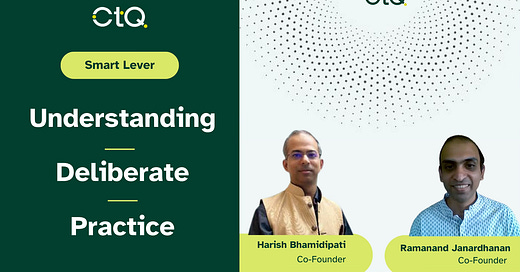Dear Uplevelers,
Today’s the last day of January & we would love to know how your New Year Resolutions are coming along. While we do talk about building habits at CTQ Compounds, we often encounter ideas that seem deceptively simple on the surface but harbor profound implications for personal and professional growth.
Most of us have heard the age-old advice: "Practice makes perfect." But what if we told you that not all practice is created equal? Through our extensive research and synthesis of expert insights, we've discovered that the way we practice might be more important than how much we practice.
Today, we're diving deep into one such concept: “deliberate practice” – a framework that perfectly embodies our twin pillars of curiosity and compounding. And as always, you can watch this video on YouTube.
The Three-Tiered Practice Pyramid
Let's break down what psychologist Anders Ericsson's research reveals about the hierarchy of practice:
1. Naive Practice: The Ground Floor
Think of this as the default mode most of us operate in. It's like a writer who writes whenever inspiration strikes, or a professional who presents without structured preparation. While it's better than no practice, it's essentially walking without a compass – movement without direction.
2. Purposeful Practice: The Middle Ground
This is where intentionality enters the picture. You have specific goals, you seek feedback, and you're willing to step out of your comfort zone. It's like a developer who deliberately takes on challenging projects to expand their skill set, or a manager who actively seeks feedback after each team meeting.
3. Deliberate Practice: The Summit
This is where the magic of compounding truly happens. Deliberate practice combines:
Extremely specific goals
Intense focus
Immediate feedback
Continuous refinement
The CTQ Connection: Where Curiosity Meets Compounding
At CTQ, we've always emphasized that true growth happens at the intersection of curiosity and compounding. Deliberate practice is perhaps the most powerful manifestation of this principle. Here's why:
Curiosity Aspect:
It pushes you to understand the mechanics of your skill
It encourages deep questioning of established methods
It promotes exploration of optimal learning approaches
Compounding Aspect:
Each deliberate practice session builds upon the last
Skills developed through this method tend to be more permanent
The approach itself becomes a meta-skill that transfers across domains
The Environment Factor: Benign vs. Wicked
One of the most fascinating aspects of skill development is understanding your learning environment. Through our research, we've identified two distinct types:
Benign Environments:
Stable conditions
Clear rules
Predictable outcomes
Example: Learning a musical scale
Wicked Environments:
Variable conditions
Complex interactions
Unpredictable outcomes
Example: Leading a team through organizational change
Why This Matters for Future-Readiness
In today's rapidly evolving professional landscape, understanding these distinctions is crucial. The ability to identify your environment and adjust your practice approach accordingly is a meta-skill that compounds over time.
1. For Individual Contributors:
Map your key skills on the practice hierarchy
Identify which skills are in benign vs. wicked environments
Design deliberate practice routines for core competencies
2. For Team Leaders:
Create structured learning environments that support deliberate practice
Build feedback mechanisms that accelerate skill development
Balance stable and variable learning conditions
3. For Organizations:
Develop training programs that incorporate deliberate practice principles
Create environments that support both structured and adaptive learning
Build cultures that value both mastery and adaptability.
Real-World Application: The CTQ Way
Let's take a common professional skill like presentation delivery:
Naive Practice Approach:
"I'll just run through my slides a few times before the presentation."
CTQ Deliberate Practice Approach:
Record specific aspects of delivery (voice modulation, pacing, gesture use)
Analyze recordings with specific criteria
Practice problem areas in isolation
Get expert feedback on improvements
Repeat with increasing complexity
The Compounding Effect
What makes this approach particularly powerful is how it builds over time. Just as our daily 100+ minutes of reading and exploration have created a vast knowledge repository at CTQ, deliberate practice creates a compound effect in skill development.
The Future-Ready Professional
As we move forward in an increasingly complex world, the ability to learn effectively becomes more crucial than ever. Deliberate practice isn't just about getting better at specific skills – it's about becoming better at learning itself.
As part of our CTQ community, we encourage you to:
Start a practice journal
Share your deliberate practice experiences
Join our weekly skill-development discussions
Contribute to our growing knowledge base
Remember, at CTQ, we believe that the future belongs to the curious and the consistent. Deliberate practice combines both these elements, creating a powerful engine for professional growth and future readiness.
Stay curious, keep compounding.
We hope you liked this newsletter and if you wish to uplevel
Yourself: Watch our YouTube Playlist & join CTQ Compounds.
Your Team: See our Case Studies & connect with us




